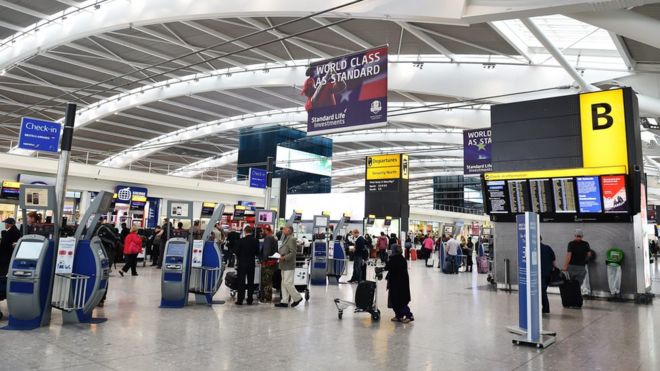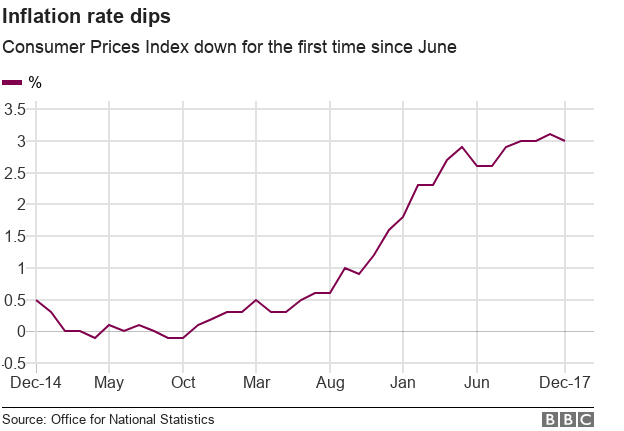
The UK's inflation rate has fallen for the first time since June, mainly because of the impact of air fares.
The inflation rate dipped to 3% in December, down from November's rate of 3.1% - a six-year high.
The Office for National Statistics (ONS) said that while air fares rose last month, it had a smaller impact than at the same point in 2016.
It added that a drop in the price of toys and games also contributed to December's fall.
The ONS said it was too early to say whether this was the start of a longer-term reduction in the rate of inflation.
The Bank of England has said it thinks inflation peaked at the end of 2017 and will fall back to its target of 2% this year.
The rate had been rising over the past year, partly due to the fall in the value of the pound since the Brexit vote which has pushed up the cost of imported goods.

In November, the Bank's Monetary Policy Committee (MPC) raised its key interest rate for the first time in more than a decade from 0.25% to 0.5%.
But Samuel Tombs, chief UK economist at Pantheon Macroeconomics, said: "The continued weakness of underlying price pressures means that the MPC has little need to rush the next rate hike."
Aberdeen Standard Investments chief economist Lucy O'Carroll agreed there was no need for another quick rise in interest rates, but said: "What matters most for the long-term health of the UK economy is improving its productivity performance.
"If we can do that then the Bank of England may be able to keep rates low for a lot longer. But on recent experience, improving productivity is much easier said than done."
Analysis: Andy Verity, economics correspondent

What a difference a 10th of a percentage point makes.
Inflation in the year to December was 3%, rather than the previous 3.1%, naturally generating predictions that it has now peaked.
One of the biggest factors driving inflation has been the inflated price of imports following the Brexit vote feeding through to the shops.
Yes, the vote and the devaluation of the pound following it was more than a year-and-a-half ago. But because many retailers buy their stock a year or two ahead, they have only felt the impact of costlier imports in the last few months.
For the same reason the recent rally in sterling, which if it lasts should bring down the cost of imports, isn't yet benefiting consumers. In fact, taking goods prices separately from services, inflation at 3.4% is higher than it's been for more than five years.
Even if inflation more broadly has peaked, the Bank of England has to bring it down over the next two to three years closer to its 2% target.
On that basis trading in the City currently forecasts the next interest rate rise will take place in August.
Wage growth
Laith Khalaf, senior analyst at Hargreaves Lansdown, said that the drop in inflation was not enough to "significantly ease the pressure on UK household spending" because wages were still rising by less than the rate of inflation.
However, he said that if that situation changed then "a sustained trend of falling inflation and better wage growth could spell happier times for the UK consumer, and the UK economy".
Howard Archer, chief economic adviser to the EY Item Club, said: "We suspect that relatively lacklustre economic growth will continue to limit domestic price pressures.
"Earnings growth seems likely to pick up only gradually as some firms remain keen to limit their total costs in a challenging and uncertain environment.
"Fragile consumer confidence may also deter some workers from pushing hard for increased pay rises, despite recent higher inflation and a tight labour market."
The Retail Prices Index (RPI), a separate measure of inflation, rose to 4.1% last month from 3.9% in November.
The ONS's preferred measure of inflation, CPIH, which includes owner-occupiers' housing costs, fell to 2.7% in December, down from 2.8% the month before.
No comments:
Post a Comment